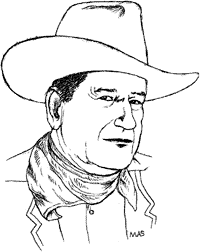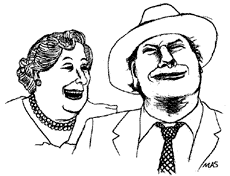Books
Texaco, by Patrick Chamoiseau, translated by Rose-Myriam Réjouis and Val Vinokurov (Pantheon). Chamoiseau's 1992 novel, newly translated from the French, wins him instant canonization and comparisons to Gabriel García Márquez, V.S. Naipaul, Salman Rushdie, and Michel de Montaigne. This 150-year history of a black Martinique family garnered France's prestigious Prix Goncourt. It earns praise for having restored grittiness to the whimsical tradition of magical realism. And its Creole-inflected language is described as "prose saturated in a kind of bemused gorgeousness" (Richard Bernstein, the New York Times). The New Yorker's John Updike dissents, calling Chamoiseau too self-conscious, "a Céline who has read Lévi-Strauss and Derrida. ... His narrative ... flows sluggishly, molasses flecked with bits of sugar cane."

John Wayne's America: The Politics of Celebrity, by Garry Wills (Simon & Schuster). A universal pan for the hyper-prolific cultural critic's latest book. Wills' analysis of Wayne as a cultural icon is deemed pretentious, long-winded, and jargon-filled. In the New York Review of Books, Michael Wood says Wills resorted to "a bundle of rather weary paradoxes: the lost but unforgettable frontier, the wilderness which is society's favorite dream." (Excerpts of the book are available here.)
The Divorce Culture, by Barbara Dafoe Whitehead (Knopf). Harsh words from across the ideological spectrum for Whitehead's attack on divorce and the permissive culture that tolerates it. The New York Times Book Review says her scholarship rates no higher than the "the popular 'expert opinion' and self-help books she rightly criticizes." The New Republic's Margaret Talbot says Whitehead and other "divorcephobes" ignore America's history of liberal divorce laws, the economics of women in the workplace, and common sense: "Parents who make each other's lives a snarling misery probably won't make their children's lives a bower of happiness." Even the conservative Weekly Standard faults Whitehead for shoddy scholarship and pop psychology. (For more debate on divorce, see the "Dialogue" between Katha Pollitt and David Blankenhorn in Slate.)
When the Sons of Heaven Meet the Daughters of the Earth, by Fernanda Eberstadt (Knopf). Eberstadt's sendup of the New York art world of the 1980s is pronounced a success. In the New York Times, Roxana Robinson says the novel--about an Upper West Side patroness and a New Hampshire painter hailed as the "white Basquiat"--has fun with "philosophical questions": "Where is the useful intersection between art and commerce? How corrosive is fame? What is Outsider Art, anyway?" The Washington Times' Brooke Allen likes the book, but complains that Eberstadt's tone becomes "overly messianic": It sometimes reads like a "pitch against the National Endowment for the Arts."
Movies
The Devil's Own (Columbia Pictures). Production problems and bad advance press boded ill for the latest thriller from Alan J. Pakula (All the President's Men). Multiple writers tried their hand at the script, which star Brad Pitt publicly attacked. But the consensus is that the film emerges solid--if uninspired--with grace notes of moral complexity. The friendship between an honest New York cop (Harrison Ford) and an Irish Republican Army terrorist (Pitt) eschews the "black-and-white formulas" typical of suspense films, says Owen Gleiberman of Entertainment Weekly). The New Yorker's Terrence Rafferty, on the other hand, finds the premise "an astonishingly banal male-bonding motif." (Click here for The Devil's Own home page.)
Chasing Amy (Miramax). Kevin Smith's low-budget romantic comedy--the third in a series that began with Clerks (1994)--wins favor for introducing a twist into the familiar boy-meets-girl plot--here, boy meets lesbian. "As obstacles in the course of true love go, that's fairly major," says Rafferty. The film is a "devastating critique of the hetero male ego," says David Ansen of Newsweek. The direction, however, is dismissed by Rafferty as "amateurish." (Miramax serves up stills and clips.)

Theater
The Young Man From Atlanta (Longacre Theatre, New York). Mixed reviews for the Broadway debut of Horton Foote's Pulitzer Prize-winning play. Critics applaud performances by Rip Torn (The Larry Sanders Show) and Shirley Knight as a middle-aged Houston couple mourning their son's death: "They get all the small regional footnotes of gesture and inflection just right. But these actors also convey the sense of an internal furnace of pain and anxiety that gives fevered glow to such minutiae" (Ben Brantley, the New York Times). However, the play itself is found wanting. Says New York's John Simon, "There's good down-home, Southern-fried atmosphere ... but where the hell is the play?"
Updates:
In the New Republic, Tony Judt calls Sidney Blumenthal's claim in The New Yorker that Whittaker Chambers attacked Alger Hiss because of spurned gay love "a smear, 1990s style. Blumenthal's contemptible insinuations are a reminder that there is nearly always something provincial and self-serving about the response of American intellectuals to Whittaker Chambers."... In the New York Review of Books, Tatyana Tolstaya praises David Remnick, author of Resurrection, a book about post-Communist Russia, as "a satirist of Gogolian persuasion; he combines the grotesque with the lyrical."
Recent "Summary Judgment" columns:
Event--The 69th Academy Awards;
Art--"1997 Biennial Exhibition" (Whitney Museum of American Art, New York City);
Art--Willem de Kooning (1904-1997);
Movie--Liar Liar;
Movie--Crash;
Movie--Selena;
Movie--The Godfather;
Book--The Coming Conflict with China, by Ross H. Munro and Richard Bernstein;
Book--Radical Son: A Journey Through Our Times, by David Horowitz.
Movie--Return of the Jedi: Special Edition;
Movie--City of Industry;
Opera--Jackie O;
Theater--Antony and Cleopatra;
Book--Arkansas: Three Novellas, by David Leavitt;
Book--Deadly Feasts: Tracking the Secrets of a Terrifying New Plague, by Richard Rhodes;
Book--Resurrection: The Struggle for a New Russia, by David Remnick;
Book--The Three-Arched Bridge, by Ismail Kadare, translated by John Hodgson.
Movie--Private Parts;
Movie--Jungle 2 Jungle;
Theater--A Funny Thing Happened on the Way to the Forum;
Book--The Kiss: A Memoir, by Kathryn Harrison;
Book--Giovanni's Gift, by Bradford Morrow;
Art--"Exiles and Émigrés: The Flight of European Artists from Hitler";
Television--The Practice.
Movie--Donnie Brasco;
Movie--Smilla's Sense of Snow;
Music--David Helfgott World Tour;
Television--Crisis Center;
Television--Feds;
Television--Arsenio;
Television--Just Shoot Me;
Book--Crazy Rhythms: Richard Nixon and All That Jazz, by Leonard Garment;
Books--First Novel Roundup;
Theater--The Last Night of Ballyhoo.
--Compiled by Franklin Foer and the editors of Slate.
